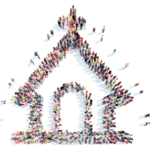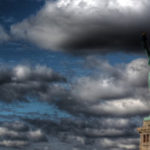Near the end of Deuteronomy, we find Moses nearing his death. The covenant first made at Sinai had been broken before Moses even got back down from the mountain. And now, barred from the Land of Promise by his own anger and impatience, he nevertheless gives some final words to the followers who will cross the Jordan and settle the land.
 Ellen Di Giosia
Ellen Di Giosia
“Choose life and prosperity or death and destruction.”
This feels like a real no-brainer. Life or death? Uh, I guess I’ll go with life. That’s like asking, “Would you rather have a million dollars or a knuckle sandwich?”
What is the people’s response? The text doesn’t tell us, but we know. Although prophets came and went, although tabernacle and temple hosted terrific worship services, the people didn’t choose the ways of life. They repeatedly promised to follow the life-giving path, then wandered off into the weeds and fell into a ditch.
As a reader, I find it infuriating. As a follower of God, I have sympathy.
 Blessings, curses & images
Blessings, curses & images
Deuteronomy is full of talk about blessings and curses. Deuteronomic theology says living according to the Ten Commandments—and all their attendant regulations—results in blessing, and living in opposition to them results in curse.
This way of looking at Scripture is dangerous. Ultimately, it drives people away from faith. Because God’s honest truth is the rain falls on the just and the unjust, and there’s not a dang thing we can do about it.
Sign up for our weekly edition and get all our headlines in your inbox on Thursdays
But what if we look at Deuteronomic theology as a description instead of a prescription? Instead of seeing blessings and curses as things God does to us, what if we think of them as images of what we become as a result of our choices?
Living in community
The Ten Commandments aren’t simply about personal ethics. They’re about how we ought to live in community. When Moses writes about the covenant demands, he writes, “You shall also love the stranger, for you were strangers in the land of Egypt.” He writes, “You shall not see your neighbor’s donkey or ox fallen on the road and ignore it; you shall help to lift it up.” He writes: “If there is among you anyone in need, do not be hard-hearted or tight-fisted toward your needy neighbor. You should rather open your hand, willingly lending enough to meet the need, whatever it may be.”
The biblical writers say God judged Israel for its unfaithfulness. But I wonder if there’s a bit of deflection there. Because when the Israelite people chose to live in ways that contradicted the covenant to which they had pledged themselves, they weakened the fabric of their communities and of their society as a whole.
They weren’t trying to choose death outright, but in just settling for basic security and a loaf of bread for their own families and not looking out for each other, they ceased to live as a cohesive nation. They made themselves vulnerable to the workings of the large, oppressive regimes that surrounded them.
Path of destruction
We can’t choose life for just us. We have to choose life for our neighbors, as well. Any other way leads to death for us all. If we pat ourselves on the back for not bowing down to a golden calf, when all we’ve done is break it into little pieces that we can shove in our pockets and hoard, that is the path of destruction.
If we demonize an entire religion because of the actions of a few, but stay silent when white Christians perpetrate horrendous violence, that is the way of destruction.
We can discuss the economic and social and political results of immigration, and we can faithfully come to different conclusions about how we should proceed. But if we do not speak out when people can walk into homes unannounced and tear parents away from vulnerable children, that is the path of destruction. It is life for me, mine and ours—and death for everybody else.
Here’s the sneaky little secret about blessing and curse: God doesn’t need to send natural disasters or invading marauders. We’ll take care of the curse on our own, destroying ourselves from within.
Ellen Di Giosia is associate pastor of faith formation at Woodland Baptist Church in San Antonio.














We seek to connect God’s story and God’s people around the world. To learn more about God’s story, click here.
Send comments and feedback to Eric Black, our editor. For comments to be published, please specify “letter to the editor.” Maximum length for publication is 300 words.